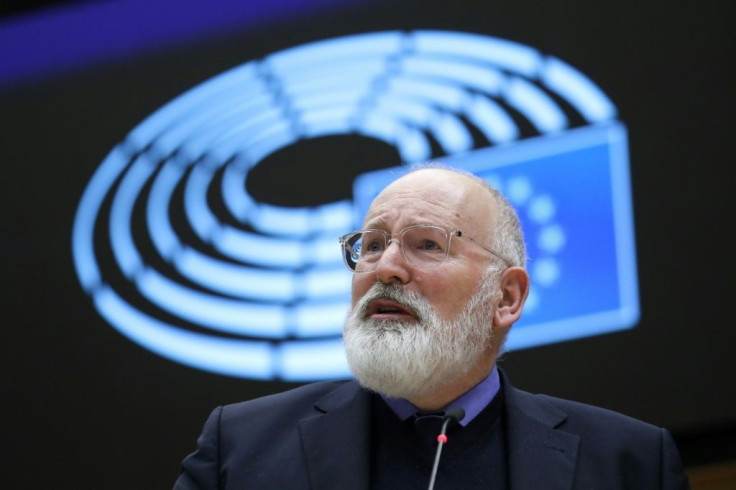Eastern EU States Opposed To 2050 Zero-emissions Goal

Eastern EU members Poland, the Czech Republic and Hungary have opposed the bloc's target of zero net carbon emissions by 2050.
They argue it would hamper the development of their coal-dependent economies and want the EU to shoulder the huge costs of switching to renewables.
Here are the challenges these formerly communist EU members face on the path to carbon neutrality.
Poland needs to spend an estimated 700 to 900 billion euros ($780 billion to one trillion dollars) to achieve zero-emissions, its then-energy minister told local media in October.
Its massive Belchatow brown coal-fired power station is Europe's largest such plant and its "single largest greenhouse gas emitter," according to the ClientEarth global environmental NGO.
Right-wing Prime Minister Mateusz Morawiecki rejected the 2050 zero emissions goal at a summit in June, insisting it could cripple Poland's vibrant economy.
Warsaw wants the bloc to fund a "fair" transition to carbon neutrality for the ex-communist country of 38 million people that depends on coal to generate some 80 percent of its power.
Climate Minister Michal Kurtyka expressed optimism about the EU's proposal to mobilise 100 billion euros over nearly a decade to help achieve zero-emissions, but warned that "public funds alone will not be enough."
Government plans call for coal to generate 60 percent of electricity in 2030, the date the EU has set to phase out its use.
Warsaw is seeking a 30-percent share of coal in the power mix by 2040, when the proportion of renewables will rise to 30 percent and the first nuclear power unit is due to be online.
Renewable energy use declined since 2016 after the Law and Justice (PiS) government blocked the development of wind power on land. But in a recent turnaround, it vowed to invest in solar and offshore wind.
A majority 69 percent of Poles want Warsaw to stop blocking the EU's 2050 zero-emissions goal, according to a fresh survey by the independent Kantar pollsters.
The Czech Republic also wants the European Union to shoulder part of the estimated 26.5 billion euros ($29.3 billion) it needs to spend to become carbon neutral, a sum that Prime Minister Andrej Babis termed "astronomic".
While most EU members expect to cut carbon dioxide emissions to zero by 2050, Czechs aim to reach 80 percent of the goal by then.
Fossil fuels made up 57 percent of the Czech Republic's energy mix last year, with nuclear power accounting for 37 percent and renewable resources six percent, according to the OTE state-owned energy market operator.
Prague wants the EU to accept nuclear energy as an emissions-free source.
It plans to build a new multi-billion-euro nuclear unit at the southern Dukovany plant by 2036. It is seeking a 40-percent share of nuclear energy in its mix by 2040, up from 30 percent in 2016.
Czechs aim to reach a 22-percent share of renewable energy by 2030.
Hungary estimates it will need 150 billion euros to achieve carbon neutrality by 2050 and has ruled out bearing the "heavy burden" alone.
Budapest says it "cannot write a blank cheque" to fund the transition.
"It has to be made clear that more expensive energy or food cannot be a consequence of the 2050 target," says Gergely Gulyas, a minister who heads the office of populist Hungarian Prime Minister Viktor Orban.
"It is only and exclusively acceptable if it comes with serious EU contributions," he added, speaking on Thursday.
Fossil fuels account for 40 percent of Hungary's power production, with coal-fired power meeting just 16 percent of the electricity needs in this country of ten million people.
Calling itself "a climate champion" and insisting that it is "one of the few" able to reach the EU's 2030 climate targets, Hungary considers nuclear power a must.
It makes up around half of generated electricity, and a third of the power consumed.
Some observers suggest that Budapest will reject the EU's 2050 target for carbon neutrality alongside its central European partners to pile the pressure on Brussels during tricky negotiations over the bloc's 2021-2027 budget.
Hungary fears there may be serious cuts to the EU structural funds it receives.
"Viktor Orban thinks he can exchange lifting his veto (on the climate plan) for an increase in the allocated funds," said Benedek Javor, a former Hungarian MEP.
© Copyright AFP {{Year}}. All rights reserved.





















